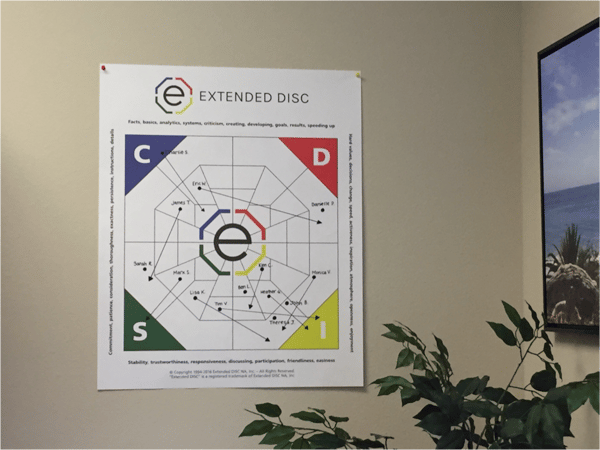Becoming a new manager is one of the most exciting and challenging transitions in a career - so, how do we keep the momentum going forward?
It is exciting; but it can also be one of the most stressful times. Your success is now less about you, and more about helping your employees achieve their goals. How do you start?
New manager challenges
 You're going to be pulled in more directions. There's pressure from the leadership above and pressure from your direct reports below. It essentially boils down to one of the greatest challenges for any manager; which is managing people. It plays a critical role in determining your success as a manager, and it can be the most intimidating and hardest thing you will ever do.
You're going to be pulled in more directions. There's pressure from the leadership above and pressure from your direct reports below. It essentially boils down to one of the greatest challenges for any manager; which is managing people. It plays a critical role in determining your success as a manager, and it can be the most intimidating and hardest thing you will ever do.
People can be unpredictable and very different from ourselves. Unfortunately, they don't come with personal instruction manuals. Yes, there are tips for new managers like finding a good mentor and knowing how to delegate wisely. They essentially encapsulate, it's all about having successful interactions with others.
New managers need every available tool to help them to develop and become the most effective manager they can be. DISC can help you create a manual for managing and interacting with your team more effectively. DISC helps you to understand how your employees prefer to communicate, be managed, and what motivates and demotivates them. Just as importantly, DISC helps you understand how you prefer to lead.
How do you prefer to lead?
 You have natural behavioral preferences or simply put, ways you prefer to do things. For example, how do you tend to show up when you're under pressure? Do you become disorganized, emotional, task driven, etc.?
You have natural behavioral preferences or simply put, ways you prefer to do things. For example, how do you tend to show up when you're under pressure? Do you become disorganized, emotional, task driven, etc.?
Have you thought about your roles and responsibilities that likely require adjustments on your part? For example, are you someone who is comfortable following tasks from beginning to end, but know it will get you into trouble as a manager? You need to be able to delegate and let go of having full control. It may not be easy, but with conscious awareness of how you tend to do things, and practicing delegating, you will be a more effective manager.
What are your strengths? Where are your development areas? In essence, DISC helps you develop a behavioral action plan by helping you understand your natural behaviors in different situations. You can specifically use the Management Assessment to better identify how you:
- communicate
- make decisions
- manage time
- react to pressure situations
- are viewed by your employees
- are motivated
- lead
- can improve your managerial success
- can modify your behaviors with different employees
Interacting with your employees

It's important to develop rapport with your employees, but how your employees respond is not the same for everyone. Your employees will have different communication styles. What may motivate one, may end up demotivating another one. For example, if you are someone who is used to working quickly and independently, you cannot assume that your employees all want to as well. Some of your people, may become stressed and unmotivated in fast-paced settings where they don't have a chance to collaborate.
We can get into trouble by always relying on our own preconceived views. The Work Pair Assessment is a non-judgmental dialogue tool that explains how you prefer to interact and how your employee prefers to interact. Think about it, how often do you have the opportunity to share your communication preferences with others, while learning theirs? For example, you are more likely to avoid misunderstanding if both of you are aware that one of you is quieter and prefers written communication, while the other one likes to chat and meet face-to-face.
Managing your team
The Manager’s Playbook, is one of our team assessments. The team report is specifically designed to help you lead your own team more effectively. It identifies your team’s strengths and development areas. In addition, it helps you identify your team's training and development needs. The report doesn't just deliver information and data, but rather, it helps your create your own team playbook.
You put in the work, by answering questions, comparing data, processing statements, and reflecting. The dynamic playbook is designed to effectively manage your team members' behavioral styles and illicit effective adjustments when needed. The report helps to create an overall behavioral map of your team so you can pair team members up, assign jobs roles, establish interactions, and manage more effectively.
Useful tips to build success

The most critical role in the success of Extended DISC® in the workplace is you, the direct manager. Your team will follow suit if you model it by your actions and behaviors and announce it as a priority. When leading a team meeting or speaking with your employee, use the language of DISC. Another way to clearly send the message that DISC is valuable is to display your team on the Extended DISC® Diamond (image above). When you consistently use DISC in your everyday language, as a manager, you are virtually guaranteeing that DISC will become part of your team’s culture.
The more prepared you are for your role as a manager, the greater the likelihood you will get off to a solid start. Extended DISC® gives you an insider's advantage into the hardest area of managing; how to manage people. The most successful managers have a keen sense of self-awareness; they use their strengths and are aware of the areas they need to improve upon and do not deny or ignore them. In addition, they are able to identify others’ styles and modify their own. They are always mindful and present. Are you as prepared as you can be?
